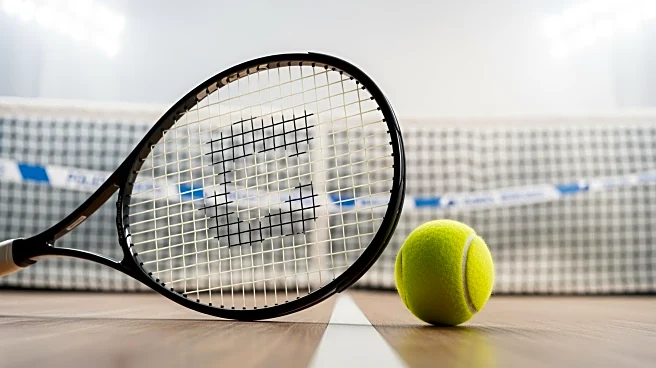What's Happening?
Cameron Norrie, Britain's No. 2 tennis player, achieved a significant victory against Andrey Rublev at the Erste Bank Open in Vienna. Norrie won the match with scores of 6-2, 6-7 (5-7), 6-2, marking his
fourth win against top-20 opponents in 2025. Rublev, who recently celebrated his 28th birthday, experienced his fifth consecutive loss and displayed frustration by smashing his racket during the match. Despite Rublev's efforts to recover by winning the second set tie-break, Norrie maintained his composure and secured the win in the third set, advancing to the second round of the ATP 500 event.
Why It's Important?
Norrie's victory is significant as it highlights his growing prowess on the international tennis stage, particularly against high-ranking opponents. This win not only boosts Norrie's confidence but also enhances his standing in the ATP rankings. For Rublev, the loss adds pressure as he seeks to overcome a series of defeats. The match underscores the competitive nature of the ATP tour and the challenges faced by players in maintaining consistency. Norrie's success may inspire other British players and contribute to the UK's presence in global tennis.
What's Next?
Following his victory, Cameron Norrie will continue his campaign at the Erste Bank Open, aiming to progress further in the tournament. His next matches will be crucial in determining his momentum and potential ranking improvements. Meanwhile, Andrey Rublev will need to regroup and address his recent performance issues to regain his form. The tournament will continue to showcase high-stakes matches, with other players like Jacob Fearnley and Alexander Zverev competing in Vienna.
Beyond the Headlines
The match between Norrie and Rublev highlights the emotional and psychological aspects of professional tennis, where players must manage stress and expectations. Rublev's reaction during the match serves as a reminder of the intense pressure athletes face. Norrie's ability to maintain focus and composure is a testament to his mental resilience, which is crucial for success in sports.









